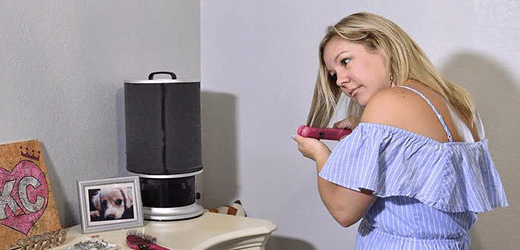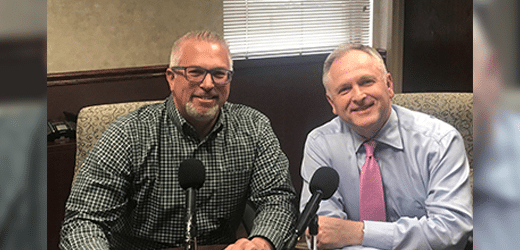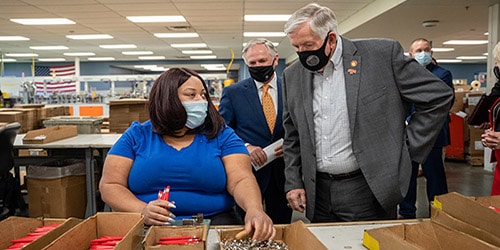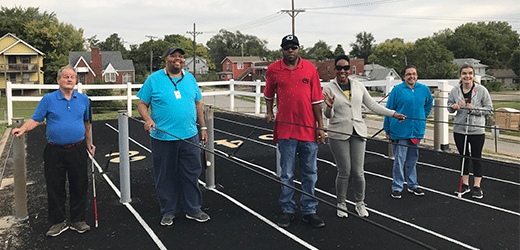Dating with a disability: ‘I don’t feel like a burden … Why should I act like one?’

(Originally published on August 16, 2018 in the Kansas City Star)
When Kirby Hough meets a man for a first date, she deceives him until she believes he is worthy of the truth.
He will walk into the bar or restaurant and find Hough already there, oblivious to his entrance, her almond-shaped brown eyes staring into the iPhone in her palm.
“They probably think I’m scrolling Instagram,” she says with a laugh.
Eventually, he will realize she’s “not paying attention,” walk over to her and utter her name or perhaps tap her on the shoulder — just as Hough wants him to do.
“I can’t just sit there and be looking at the door when a guy walks in,” Hough says. “Because then he’ll smile or wave and I’ll look directly past him. I won’t know he’s there.”
Hough, 33, has optic nerve atrophy, a condition that, before she was born, stunted the development of the optic nerves that connect her eyes to her brain. As a result, Hough can barely make out details beyond a few inches away.
She says she’s “both near- and farsighted.” She can see well enough to function independently. Hough (pronounced “Huff”) dresses herself, applies her own makeup, moves freely throughout her Kansas City home and full-time job as a contract specialist at Alphapointe, a rehabilitation, advocacy and employee hub for the blind and visually impaired.
But when it comes to noticing finer details from afar, like the freckles on a guy’s face that might have made her swipe right, those are impossible to see until they are quite literally in front of her face.
The reveal of her condition is often inevitable, Hough says. But that doesn’t mean she’s interested in kicking off the date with a disability disclaimer. “I don’t feel like people are going to judge me,” she says. “It’s just kind of long to explain, and it’s like, if I’m not interested in this person, I’m not going to waste my time or theirs.”
Simi Linton, co-director of the Disability/Arts/NYC Task Force, says this decision of when and how to reveal a disability “absolutely” belongs to the disabled individual.
“When you live in a world in which disability is ‘othered,’ stigmatized and devalued, each person can negotiate how and when they’re going to disclose that,” she says. “It would be great if we all could be more upfront and more comfortable about it and make that choice based on personal preference rather than fear of rejection or judgment, but I don’t think we’re there yet.”
People with disabilities are the largest minority group in the U.S. — 19 percent of the population, according to the National Center on Disability and Journalism.
Yet, despite their unmissable presence, many disabled people find dating especially challenging. As Instagram, Tinder, Grindr, Bumble and other dating tools place a premium on physical vigor and Your Personal Brand, disabled people increasingly find themselves taking extra steps to prove their worth.
“Even as a kid, I never wanted to be different, or look different or do anything differently from anybody else,” Hough says. “I have that same mindset when it comes to dating.”
Hough rarely leaves a first date with a guy she’s interested in without mentioning her condition. The goal, with Hough and most individuals with disabilities, is to show that their disabilities are a facet of them instead of the definition.
As for Hough: “It’s not that I mind telling people,” she says, “it’s just that I don’t want to say it offhand.”
She describes her dating life as “active” and says she doesn’t think a guy has ever specifically distanced himself because of her disability, though she admits it’s hard to know. “People are pretty cool with it.”
To set the tone from a date’s onset, Hough assumes a role of normalcy, akin to a meticulous human resources manager interviewing a potential hire.
First, there’s the initial review. If a guy approaches her while she’s out with a group of girlfriends, she’ll return the flirting a guy may throw her way. Then, when he walks off she’ll ask if he was cute or not.
“My girls know me pretty well,” she says. Like with most people, looks matter, especially up close. Hough swoons for the “tall, dark and handsome.”
If the guy gets her team’s approval, maybe she’ll give him her number and he’ll give her a hug goodbye — a perfect time to quickly gauge general physique, scent and the other intricacies an embrace provides. Hough works out religiously and sports a toned, svelte physique to show for it. “Fitness is important to me. I want a guy who at least shares some interest in it,” she says.
Most people can indulge in the spontaneity of dating, but for Hough that’s too risky. “I have to be really prepared,” she says.
She usually confirms a meet-up spot days beforehand, preferably somewhere where she already knows which cocktail and seafood dish she likes or which side the women’s restroom is on (one time she walked into a men’s room).
If she’s never been to the place, she can look up the menu online, using the zoom function on her screen, to figure out what she wants beforehand.
Hough can’t drive, so she’ll call an Uber to get her to her destination, preferably 15 minutes early.
“It’s really hard if I’m running late,” she says with a laugh. If she is, she might have an awkward encounter from the onset, like that time she was walking to the pool at her apartment and a guy she’d been talking to waved at her from a few feet away and she completely blew him off.
“He was like, ‘I thought you were upset at me,’ and obviously, that wasn’t the case.”
While they sit and wait for a drink or a bite, Hough will go through the “normal” motions. She’ll occasionally glance at the TV in the corner playing, say, a Royals game, even though she can barely make out the green of the outfield or Danny Duffy’s windup.
She’ll hold up the menu and look it over, despite having decided her full order long before. Maybe the guy will show her a picture of his dog on her phone. From across the table the photo is a blur, but she’ll call the pet cute and continue the conversation without a blip. “I play off a lot of things,” Hough says.
“I don’t feel like a burden or a handicap at all,” she says. “Why should I act like one?”





